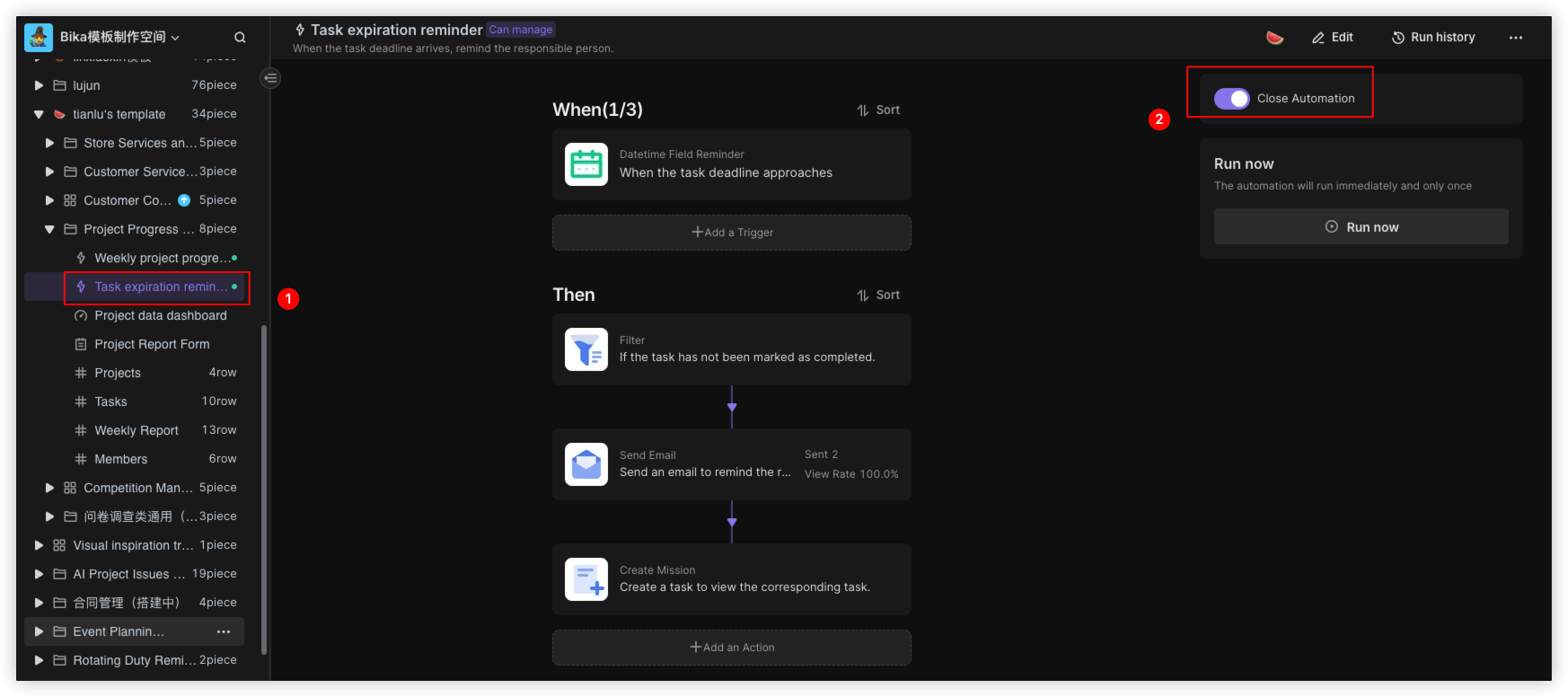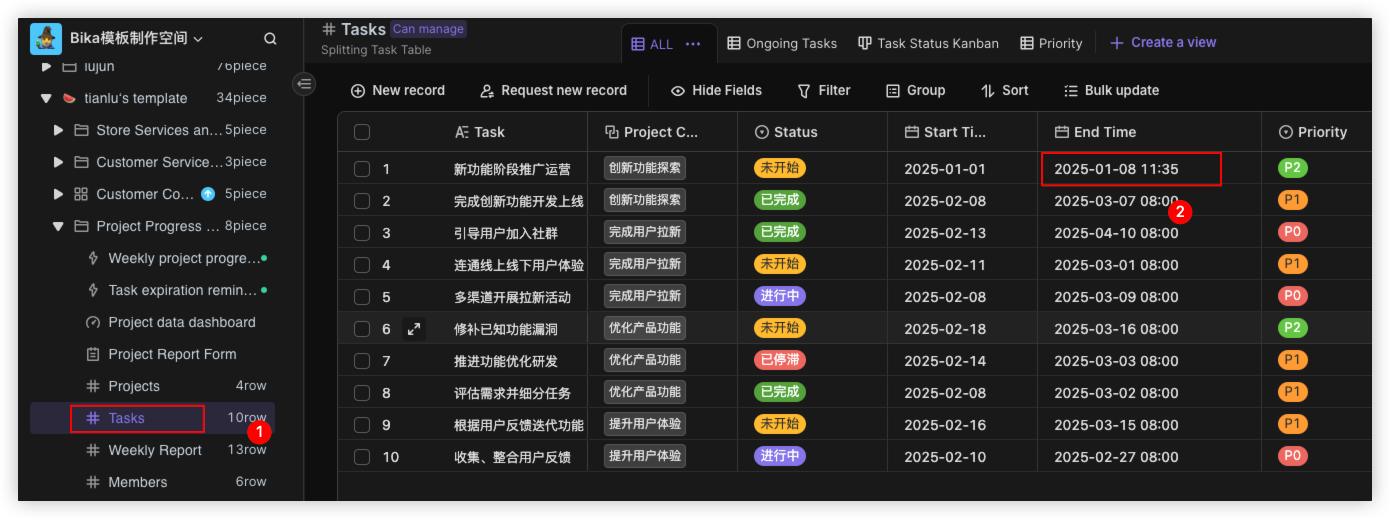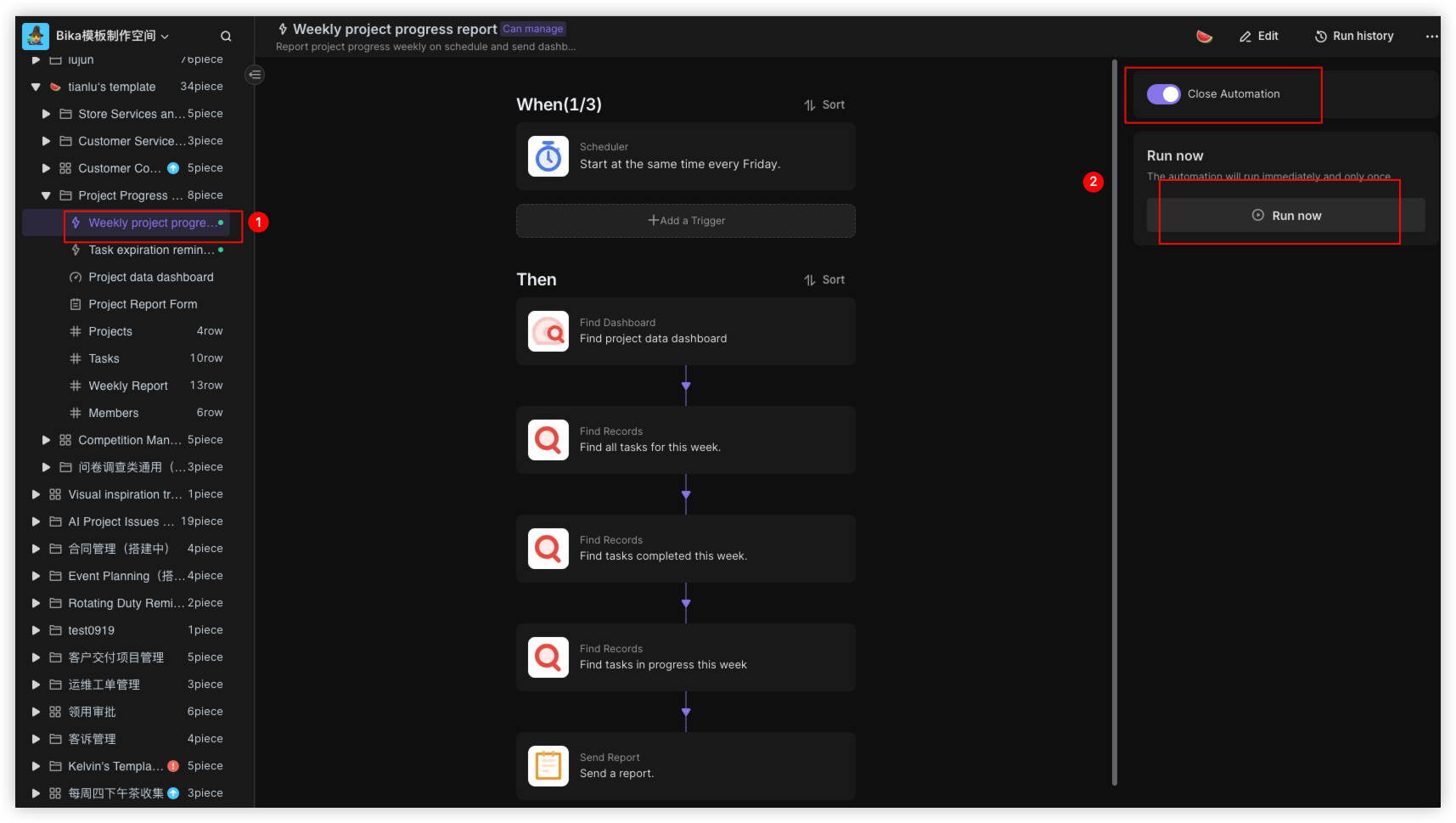
Grow Faster, Work Less: Top Marketing Automation Tools for Startups
Why Marketing Automation is Crucial for Startups in 2025
In 2025, startups are navigating a highly competitive business landscape. With limited budgets and small teams, the need for rapid growth is more pressing than ever. Marketing automation has emerged as a game - changer for these early - stage businesses.
Marketing automation refers to the use of software platforms and technologies to automate repetitive marketing tasks. This includes activities such as email marketing, social media posting, lead nurturing, and customer segmentation. The core purpose is to streamline marketing processes, allowing businesses to focus on more strategic initiatives.
For startups, marketing automation tools offer a plethora of benefits. Firstly, efficiency is significantly enhanced. Startups often have to juggle multiple tasks with a lean workforce. Marketing automation tools can handle routine tasks like sending follow - up emails, freeing up valuable time for the team to engage in more creative and high - value activities.
Secondly, consistent lead nurturing becomes possible. By setting up automated workflows, startups can ensure that leads are nurtured at every stage of the sales funnel. This consistency helps in building trust with potential customers and increasing the likelihood of conversion.
Personalized communication is another key advantage. Marketing automation tools for start - ups can analyze customer data to deliver personalized messages. This tailored approach makes the marketing efforts more relevant to the target audience, improving engagement rates.
Data - driven decisions are also facilitated. These tools provide in - depth analytics on marketing campaigns, such as open rates, click - through rates, and conversion rates. Startups can use this data to optimize their marketing strategies and allocate resources more effectively.
Finally, scalability is a major benefit. As startups grow, their marketing needs expand. Marketing automation tools can easily scale to accommodate increased volumes of leads, customers, and marketing activities.
:::: key-takeaways ::::
- Marketing automation boosts efficiency by handling repetitive tasks, saving time for startups with small teams.
- It enables consistent lead nurturing, increasing the chances of converting leads into customers.
- Personalized communication based on data analysis improves engagement with the target audience.
- Data - driven insights help startups optimize their marketing strategies and resource allocation.
- The scalability of these tools supports startups as they grow and expand their marketing efforts. ::::
Top Marketing Automation Tools for Startups
In this section, we present a curated list of leading marketing automation tools suitable for startups. These tools have been selected based on their functionality, ease of use, and cost - effectiveness.
Brevo
Brevo is a comprehensive marketing automation platform that offers a wide range of features. It is particularly well - suited for startups looking for an all - in - one solution for their marketing needs.
Core Strengths: Brevo has a user - friendly interface, making it accessible even to those with limited marketing automation experience. It offers excellent email marketing capabilities, with customizable templates and advanced segmentation options.
Key Features for Startups:
- Email Marketing: Allows startups to create professional - looking emails and send them to targeted lists.
- CRM Integration: Seamlessly integrates with popular CRM systems, enabling better lead management.
- Landing Pages: Helps in creating high - converting landing pages without the need for extensive coding knowledge.
- Analytics: Provides detailed analytics on email campaigns, such as open rates, click - through rates, and bounce rates.
- Pricing Model: Offers a free plan with basic features, making it an attractive option for budget - conscious startups. As the business grows, there are affordable paid plans with more advanced features.
Pros/Cons from a Startup Perspective:
- Pros: The free plan is a great starting point for startups. The ease of use and wide range of features make it a versatile tool.
- Cons: Some advanced features may require a steeper learning curve for beginners.
![brevo]() Brevo
Brevo
HubSpot
HubSpot is a well - known name in the marketing automation space. It is ideal for startups aiming for long - term growth and looking to build a comprehensive marketing and sales ecosystem.
Core Strengths: HubSpot offers a unified platform that combines marketing, sales, and customer service tools. This integration provides a holistic view of the customer journey.
Key Features for Startups:
- Email Marketing: Comes with a drag - and - drop email builder, making it easy to create engaging emails.
- Lead Scoring: Helps startups prioritize leads based on their behavior and engagement, ensuring that sales teams focus on the most promising prospects.
- CRM: A powerful built - in CRM system that stores all customer - related data in one place.
- Content Management: Allows for the creation and management of blog posts, landing pages, and other marketing content.
- Pricing Model: Has a free CRM version. For marketing automation, there are tiered plans based on the number of contacts and the level of functionality required.
Pros/Cons from a Startup Perspective:
- Pros: The integration of multiple tools simplifies the marketing and sales process. The free CRM can be a great asset for startups just starting out.
- Cons: The paid plans can be relatively expensive for very early - stage startups on a tight budget.
![hubspot]() HubSpot
HubSpot
Customer.io
Customer.io is a marketing automation tool that focuses on customer - centric messaging. It is perfect for startups that want to deliver highly targeted and personalized messages to their customers.
Core Strengths: Customer.io excels in its ability to send triggered emails and in - app messages based on customer behavior. This real - time messaging ensures that customers receive relevant information at the right time.
Key Features for Startups:
- Behavior - Based Messaging: Allows startups to send messages based on actions like product usage, page views, or purchases.
- Segmentation: Enables precise segmentation of customers, ensuring that the right message reaches the right audience.
- Analytics: Provides detailed analytics on message performance, helping startups understand what works and what doesn't.
- Pricing Model: Offers a usage - based pricing model, which can be cost - effective for startups with varying customer volumes.
Pros/Cons from a Startup Perspective:
- Pros: The behavior - based messaging is a powerful feature for engaging customers. The usage - based pricing can be flexible for startups.
- Cons: It may be less suitable for startups looking for a more general - purpose marketing automation tool with a wide range of non - messaging features.
![customer-io]() Customer.io
Customer.io
Mailchimp
Mailchimp is a popular marketing automation tool, especially known for its email marketing capabilities. It is a great choice for startups that are primarily focused on building and growing their email lists.
Core Strengths: Mailchimp has an intuitive interface and a large library of pre - designed email templates. It also offers easy - to - use segmentation and personalization features.
Key Features for Startups:
- Email Marketing: Offers a simple yet effective email creation process, with options for A/B testing.
- Audience Management: Helps in managing and segmenting email lists based on various criteria.
- E - commerce Integration: Integrates well with popular e - commerce platforms, making it suitable for online startups.
- Pricing Model: Has a free plan for up to a certain number of contacts. Paid plans offer more advanced features and higher contact limits.
Pros/Cons from a Startup Perspective:
- Pros: The free plan is very accessible for startups just starting their email marketing journey. The e - commerce integration is a plus for online businesses.
- Cons: Some users may find the advanced features in paid plans a bit limited compared to more comprehensive marketing automation tools.
![mailchimp]() Mailchimp
Mailchimp
Essential Features to Look for in Marketing Automation Tools for Your Startup
When choosing marketing automation tools for start - ups, several key features and considerations should be taken into account.
Ease of Use/User Interface: Startups often don't have the luxury of dedicated marketing automation experts. A tool with an intuitive and easy - to - navigate interface is essential. This allows the team to quickly get up to speed and start using the tool effectively without extensive training.
Pricing/Scalability: Given the budget constraints of startups, pricing is a crucial factor. Look for tools that offer a freemium model or affordable tiered plans. Additionally, the tool should be able to scale as the startup grows. This means that it can handle an increasing number of leads, customers, and marketing activities without a significant increase in cost.
Core functionalities:
- Email Marketing: Email remains a powerful marketing channel. The tool should offer features like customizable templates, list segmentation, and analytics for email campaigns.
- Lead Scoring: Helps in identifying the most promising leads, allowing the sales team to focus their efforts more effectively.
- CRM: Integrating marketing and sales data through a CRM system is essential for a seamless customer journey.
- Analytics: Provides insights into the performance of marketing campaigns, enabling data - driven decision - making.
Integration capabilities with other tools: Startups usually use a variety of tools for different aspects of their business, such as CRM, sales, and website builders. The marketing automation tool should be able to integrate with these existing tools to ensure a smooth flow of data and operations.
Customer Support & Resources: In case of any issues or questions, having access to reliable customer support is crucial. Additionally, resources like tutorials, documentation, and community forums can help startups make the most of the tool.
Beyond Standalone Tools: Elevating Marketing Automation with Workflow Integration
While marketing automation tools are great for handling specific tasks, the real power lies in connecting and automating marketing workflows. Platforms like Bika.ai can take marketing automation to the next level.
Bika.ai can orchestrate complex, cross - platform campaigns. It enables deeper personalization by combining data from multiple sources. For example, data from the CRM system can be used to create more targeted email campaigns. Seamless data flow between systems, such as from sales to marketing, ensures that the marketing efforts are in sync with the overall business goals.
Automated customer journeys can be created, where customers are guided through a series of interactions based on their behavior. This not only improves the customer experience but also increases the efficiency of marketing operations. Operational efficiency is further enhanced as Bika.ai can automate tasks across different marketing automation tools, reducing manual intervention.
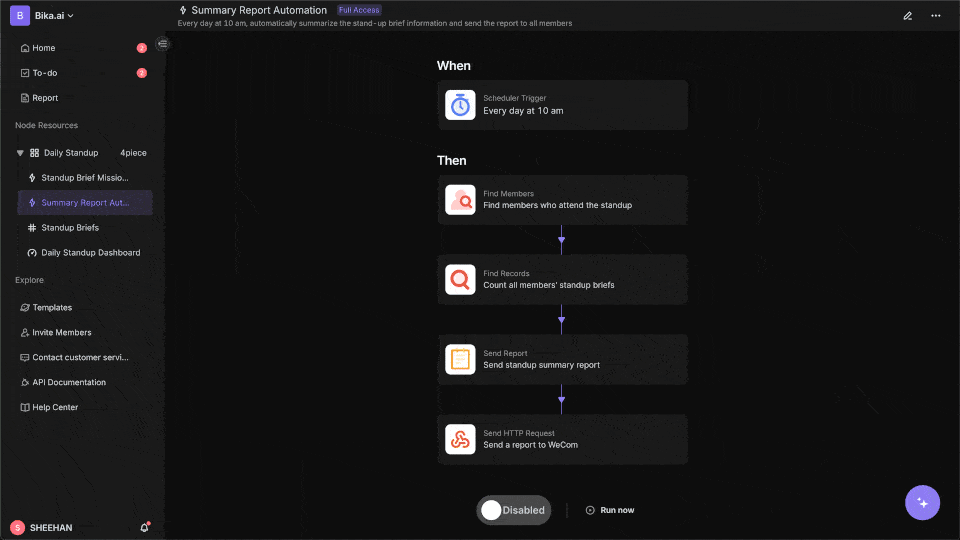
Real - World Automation: The Bika.ai Project Progress Management Template for ``
The Project Progress Management Template on Bika.ai is a powerful tool for startups. Its purpose is to centralize project information, support task assignment and tracking, and include automated report generation functionalities. This enhances transparency and coordination within the startup.
💡 Why Use the Project Progress Management Template?
This template centralizes project information, supports task assignment and tracking, and includes automated report generation functionalities to enhance transparency and coordination. By using this project progress management template, enterprises can manage the overall project progress and resources more efficiently, thereby improving the overall level of project management.
👉 How the Template Works
The template consists of the following modules:
- Weekly project progress report: Automatically generates and manages project progress and team work status reports on a weekly basis.
- Task expiration reminder: Sends email and report reminders to task owners a day before the task due date.
- Project dashboard: Provides visual analysis of key project metrics.
- Weekly Report Submission Form: Supports team members in submitting regular progress reports.
- Projects: Records the basic information of each project.
- Tasks: Tracks the tasks derived from the project, with assigned responsibilities to monitor task completion.
- Weekly Report: Allows team members to submit periodic progress report
- Members: Manages the project team members.
🎯 Steps to Use
1. Install the Template
Install this template in your Bika workspace.
2. Modify the Members Table
Go to the Members table and add project team members, so that member task assignments can be tracked.
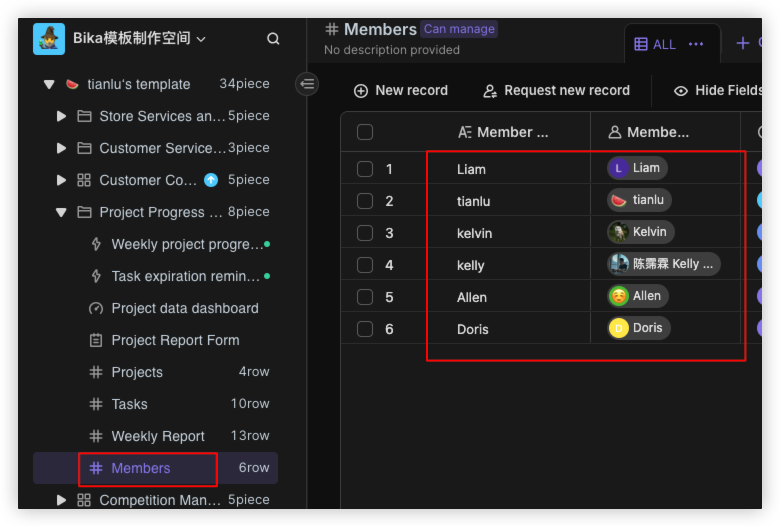
3. Configure Automation
Complete the automation task configuration:
- Edit the "
Task expiration reminder" automation:- Modify the trigger conditions and execution actions in the "
Task expiration reminder" editing interface. Enable the automation.![]()
- Modify the end time of a task belonging to you in the task list, taking into account the trigger conditions set by the due date you have established.
![]()
- Modify the trigger conditions and execution actions in the "
- Edit the "
Weekly Project Progress Report" automation:- Modify the trigger conditions and execution actions in the "
Weekly Project Progress Report" editing interface. - Test by running the automation immediately.
![]()
- Modify the trigger conditions and execution actions in the "
👉 Suitable Users
- Project Managers: Use the system to manage the overall project progress and resources.
- Project Team Members: Leverage the system to track their own tasks and progress.
- Project Decision - Makers: Analyze the project status through the system reports.
- Enterprise Managers: Utilize the project data to support relevant decision - making and optimization.
This project management system provides enterprises with a centralized and efficient project management platform, which helps to improve the overall level of project management.
For startups, this template can streamline marketing tasks. For example, it can automate lead nurturing by ensuring that tasks related to follow - up emails or lead qualification are tracked and executed on time. It also enhances customer engagement by providing a clear overview of projects related to customer - facing activities. By integrating with existing marketing automation tools for start - ups, it makes the entire marketing system more intelligent and automated.
Try the Project Progress Management Template
Conclusion: Powering Your Startup's Growth with Smart Automation
Marketing automation tools have the transformative power to drive the growth of startups in 2025. By choosing the right tools based on their specific needs, startups can streamline their marketing processes, engage leads more effectively, and make data - driven decisions.
However, the real potential is unleashed when these tools are integrated and enhanced through platforms like Bika.ai. Bika.ai not only enables more complex automation but also provides templates like the Project Progress Management template, which can further optimize marketing and project - related activities.
We encourage startups to explore Bika.ai to build custom automations and achieve unprecedented marketing efficiency.

FAQ
Q: How can marketing automation tools help startups with limited budgets? A: Many marketing automation tools offer free or affordable plans. These allow startups to automate repetitive tasks, saving time and potentially reducing the need for additional staff. For example, Brevo and Mailchimp have free plans that provide basic email marketing and list management features, which are essential for startups on a tight budget.
Q: Why is integration with other tools important for marketing automation tools for startups? A: Startups typically use multiple tools for different aspects of their business. Integration ensures a seamless flow of data. For instance, integrating a marketing automation tool with a CRM system allows for better lead management. Marketing data can be used to update the CRM, and sales data from the CRM can inform marketing strategies, creating a more cohesive customer - facing approach.
Q: How does the Bika.ai Project Progress Management template enhance marketing automation for startups?
A: The Project Progress Management template centralizes project information and automates task assignment, tracking, and report generation. In the context of marketing automation, it can ensure that marketing - related projects are managed efficiently. For example, it can automate lead nurturing tasks, ensuring that follow - up emails are sent on time and that team members are aware of their responsibilities, thus enhancing the overall marketing automation process for startups.

Recommend Reading
- Grow Faster, Work Less: Top Marketing Automation Tools for Startups
- Choosing the Right AI Content Detector in 2025: A Comprehensive Review
- Choosing the Right AI Content Detector: A 2025 Comparison of Top Tools
- Grow Faster, Work Less: Top Marketing Automation Tools for Startups
- Choosing the Right AI Content Detector: A 2025 Comparison Guide
Recommend AI Automation Templates

Coming soon


Coming soon







